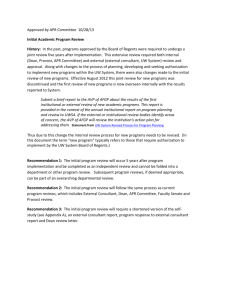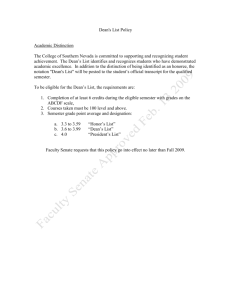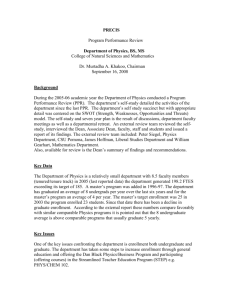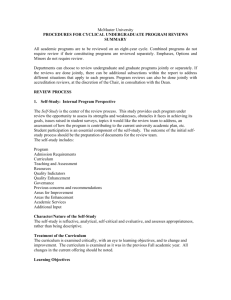Academic Program Review
advertisement
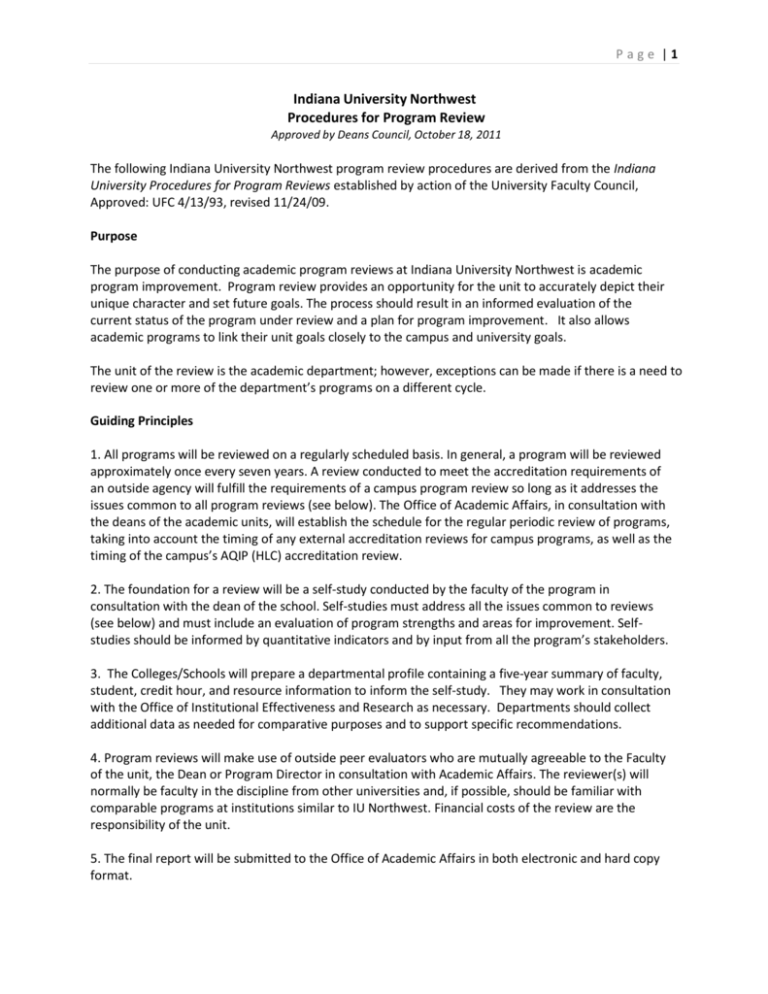
Page |1 Indiana University Northwest Procedures for Program Review Approved by Deans Council, October 18, 2011 The following Indiana University Northwest program review procedures are derived from the Indiana University Procedures for Program Reviews established by action of the University Faculty Council, Approved: UFC 4/13/93, revised 11/24/09. Purpose The purpose of conducting academic program reviews at Indiana University Northwest is academic program improvement. Program review provides an opportunity for the unit to accurately depict their unique character and set future goals. The process should result in an informed evaluation of the current status of the program under review and a plan for program improvement. It also allows academic programs to link their unit goals closely to the campus and university goals. The unit of the review is the academic department; however, exceptions can be made if there is a need to review one or more of the department’s programs on a different cycle. Guiding Principles 1. All programs will be reviewed on a regularly scheduled basis. In general, a program will be reviewed approximately once every seven years. A review conducted to meet the accreditation requirements of an outside agency will fulfill the requirements of a campus program review so long as it addresses the issues common to all program reviews (see below). The Office of Academic Affairs, in consultation with the deans of the academic units, will establish the schedule for the regular periodic review of programs, taking into account the timing of any external accreditation reviews for campus programs, as well as the timing of the campus’s AQIP (HLC) accreditation review. 2. The foundation for a review will be a self-study conducted by the faculty of the program in consultation with the dean of the school. Self-studies must address all the issues common to reviews (see below) and must include an evaluation of program strengths and areas for improvement. Selfstudies should be informed by quantitative indicators and by input from all the program’s stakeholders. 3. The Colleges/Schools will prepare a departmental profile containing a five-year summary of faculty, student, credit hour, and resource information to inform the self-study. They may work in consultation with the Office of Institutional Effectiveness and Research as necessary. Departments should collect additional data as needed for comparative purposes and to support specific recommendations. 4. Program reviews will make use of outside peer evaluators who are mutually agreeable to the Faculty of the unit, the Dean or Program Director in consultation with Academic Affairs. The reviewer(s) will normally be faculty in the discipline from other universities and, if possible, should be familiar with comparable programs at institutions similar to IU Northwest. Financial costs of the review are the responsibility of the unit. 5. The final report will be submitted to the Office of Academic Affairs in both electronic and hard copy format. Page |2 6. A one year follow-up to the report of the outside reviewers should be submitted to the College/School, with a copy to the Office of Academic Affairs. The Self-Study Outline for Departments without Professional Accreditation The departmental Self-Study must follow the topic outline below. Individual departments, in consultation with the Dean and the EVCAA, may develop additional topics specifically relevant to their own programs. For each topic, the department must provide a description of the current situation, evidence for and an analysis of effectiveness, and recommendations for further improvement. Mission Curriculum (current) Program (major, minor, general education, service) description Program learning goals Program requirements Enrollment trends Program requirements as compared to peer institutions and national standards and trends Evidence and assessment of student learning Future viability of the program Faculty (current) Qualifications, including associate faculty Faculty accomplishments: Teaching, Research, and Service (5 years) Workload assignments Demographics including proportion of faculty by title, tenured, tenure-track, non-tenure track, associate faculty Promotion and Tenure criteria Governance structure and faculty participation in governance Engagement with students and the community (5 years) Students (current) Profile Advising system / philosophy Student Organizations Accomplishments Alumni - satisfaction, graduate school, job placement of recent graduates Other Programs/Services Special Programs - Centers of Excellence, lecture or performance series, etc. Outreach/Community connections Page |3 Facilities and Resources Administrative/support staff Office and teaching space Research space and resources Special space needs Analysis and Recommendations Departmental strengths, challenges, and areas for improvement Analysis of whether the program is stronger than, the same as, or weaker than it was at the time of the last review (or 5-7 years ago if this is the first time the program has been reviewed)? Strategic goals and objectives for the next 3-5 years, including o What will it take to enhance program quality and move the program to the next level? o How the department would prioritize and allocate additional resources The Self-Study Outline for Departments with Professional Accreditation In lieu of a full Program Review, departments subject to professional accreditation will submit a copy of their accreditation self-study, the report of the site visitors and the final accrediting report. Page |4 Suggested Time Line for Program Reviews Dates January 1 Jan.- Feb. Actions Notify dean and program directors/chairs of schedule of program review Organize self-study process, including addition of any extra topics for inclusion in self-study and identify external reviewer(s) Responsibility OAA Dean and faculty June 1 Submit self-study to dean and VCAA July 1 Dean and VCAA comment on self study July 31 Final version of self-study completed Faculty Send self-study to external reviewer(s) Dean September Campus visit of external reviewer(s) Dean October Receive external reviewer’s report August 1 October Year 2 One Year Follow-up Report to Dean (copy to OAA) Faculty Dean, VCAA External reviewers Department/Unit Page |5 INDIANA UNIVERSITY PROCEDURES FOR PROGRAM REVIEWS (Approved: UFC 4/13/93, 11/24/09) The Educational Policies Committee has slightly revised and endorsed the following procedures for program review that were initially formulated by the Academic Cabinet. The purpose of the recommendations is to regularize the process of program review throughout the system while at the same time leaving to each unit sufficient latitude to define the parameters of the review in the light of its own particular mission. Accordingly, the EPC recommends: 1. that Indiana University implement a campus-based system of regular periodic (once every 5-7 years) program reviews of individual departments and schools; 2. that the reviews be conducted by the chancellor/provost or dean (for large units); 3. that the reviews make use of outside peer reviewers who are mutually agreeable to the faculty of the unit and the dean or chancellor/provost; 4. that the faculty of the unit under review prepare a mission statement for the unit and a statement of goals to be used by the appointing officer in charging the outside reviewers; 5. that there be within one year a follow-up to the report of the outside reviewers indicating the steps taken to address the report, with copies to the outside reviewers; 6. that all reviews address certain essential questions: (a) What are the students learning? Is the curriculum of the unit consistent with the unit's mission? (b) Are the teaching, research, and service activities of the faculty consistent with the unit's mission? (c) Is the unit better than, the same as, or worse than it was five (seven) years ago? (d) What changes are needed in the next five (seven) years; 7. that the unit under review and the outside reviewers have support services to provide certain items of information useful in assessing progress, such as the number of graduates, retention, external grants and contracts, the diversity of the faculty and student body; 8. that each chancellor/provost and dean submit to the Chair of the Academic Cabinet at the end of each year a list of programs that were reviewed that year.


